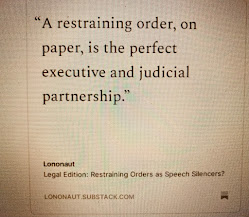Legal Edition: Restraining Orders as Speech Silencers?
Whether compromising principles or increasing national debt, America’s political landscape seems to attract people too shameless to care about anything other than their own power. One way to maintain power has always been exclusion, whether by complex rules understandable mostly by insiders (e.g., the Catholic Church method, which prompted the Napoleonic Code) or by enlisting the executive branch to harass individuals, then protecting and rewarding those who “follow orders.” As cynical as I’ve become in my older age, I did not anticipate, in twenty-first century U.S.A, how easily judges could be recruited into “following orders” or taking the path of least resistance, whether by allegiance to established law firms or plain laziness.
A restraining order, on paper, is the perfect executive and judicial partnership. The executive acts after an independent judge has reviewed the facts, and if a fist or taser is later deployed by the government, a citizen can be satisfied outside review mitigated his/her chances of harm. If all else unfairly favors the executive branch’s relentless copulation with the natural resources industry, at least here, the upper crust deigned to provide some measure of individual respect. In reality, TROs (temporary restraining order), WVROs (workplace violence restraining order), and other restraining orders have been co-opted by lawyers looking to abuse yet another code section, legislative intent be damned. Think of the judge reviewing an application for protection as a boy entering a toy store: whomever and whatever he sees first causes emotional attachment, even if better choices are within reach. Consequently, though the law itself—at least in California—carefully balances the right to free speech with the right to be free from violence, procedure favors whomever rushes to the courthouse first, and only twenty-four hours notice is required.
A casual observer at the ex parte morning calendar—before the day’s regular proceedings—will notice mostly attorneys against hapless non-attorneys, assuming defendants could get time off from work or other obligations. Faced with a smaller but faster serving of complex law and even more complex procedure, state court judges routinely rubber-stamp applications for restraining orders and tell defendants to make their case at the next hearing.
Practically speaking, no real checks against frivolous applications for restraining orders existed until last year, 2022, when California’s 6th District Court of Appeal issued a published opinion in Technology Credit Union vs. Matthew Mehdi Rafat, 82 Cal.App.5th 314 (Cal. Ct. App. 2022) that clarified rude and obnoxious behavior, without some indication of violence or a threat of violence, is insufficient for a restraining order. I hadn’t mentioned the appeal until now because the opinion, while well-done, ignored constitutional issues and didn’t overturn an earlier case I mentioned as wrongly decided. Additionally, though appellate courts must generally accept all facts set forth by the trial court as true, in my case, I believe the 6th District missed an opportunity to rule that lower court judges must review all evidence admitted, and if citing such evidence, must provide written analysis of its relevance.
Recently, Jacquelynn L. Hansen vs. Oleg Volkov, Los Angeles County, B311524 (2023) was certified as a published opinion, giving judges more ammunition to deny frivolous or borderline applications for restraining orders. More specifically, the Volkov case, for the first time in California, carved out specific conduct as constitutionally-protected activity and therefore not properly the basis of a restraining order. It also held a single incident does not satisfy the “course of conduct” prong in the statute. Finally, the Volkov court affirmed appellate courts’ independence in matching the facts given by the lower court to the legally required threshold for a restraining order:
“[W]hether the facts, when construed most favorably in [petitioner’s] favor, are legally sufficient to constitute civil harassment under section 527.6, and whether the restraining order passes constitutional muster, are questions of law subject to de novo review.” (R.D. v. P.M. (2011) 202 Cal.App.4th 181, 188; accord, Harris v. Stampolis (2016) 248 Cal.App.4th 484, 497.)
It’s disheartening that it took so long for appellate courts to restrict the use of restraining orders to suppress disfavored or disagreeable speech. Perhaps we should mention defendants and appellants in both Volkov and Rafat are licensed attorneys in good standing. You might focus on the defendants’ professional status, but I view it differently. I see an immigrant with an Arabic/Palestinian last name and a man with a Russian last name helping protect Californians from sly legal maneuvers used by habitual or politically-connected “customers” in lower courts. That’s my story, and I’m sticking to it. If you disagree, sue me at your own risk.
© Matthew Mehdi Rafat (October 2023)
Dedicated to Timothy Michael Kowal of Newport Beach, California, a scholar and a gentleman.



Comments
Post a Comment